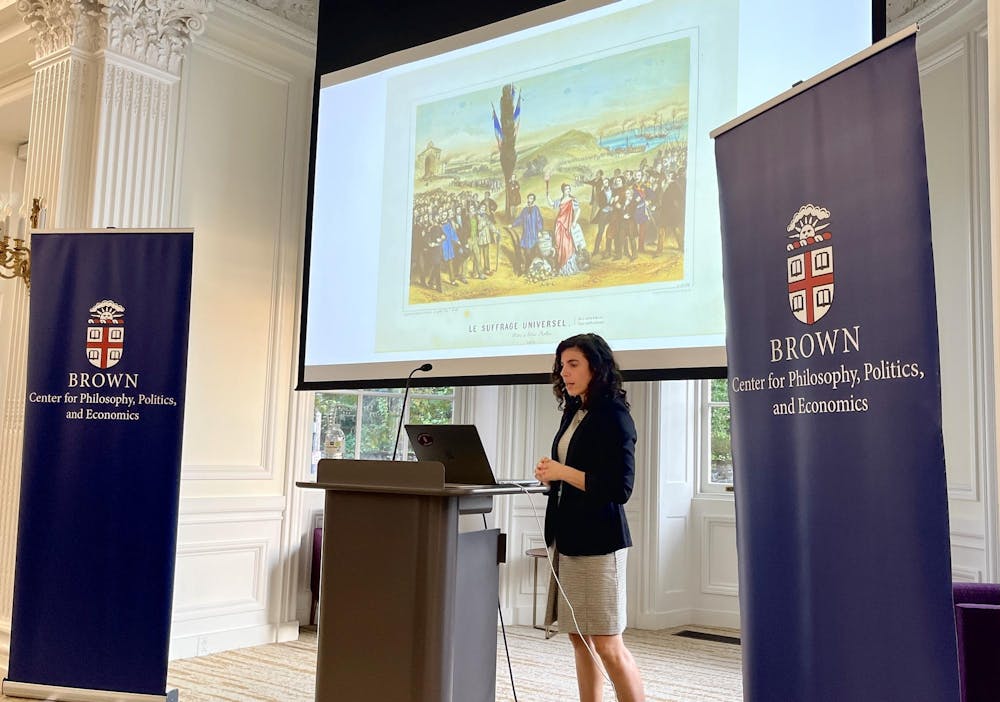Gianna Englert, an associate professor of humanities at the University of Florida, visited Brown on Thursday to discuss her book investigating the tensions between liberal and democratic ideologies in 19th century France.
The book, titled “Democracy Tamed: French Liberalism and the Politics of Suffrage,” was the center of Englert’s talk hosted by the Center for Philosophy, Politics and Economics as part of its Odyssey Lecture series. Englert previously served as a postdoctoral research associate and a visiting lecturer at Brown.
Her talk concerned liberalism, an ideology promoting individual liberties, and democracy, a political system in which leaders are elected by the public. Englert argued that liberalism and democracy have historically been at odds.
“In the last decade or so … it’s become apparent that liberal regimes will not necessarily result from free and fair elections,” said Englert. “In other words, we may not always choose liberalism.”
She drew attention to the 2024 Freedom in the World report, which found that “global freedom declined for the 18th consecutive year in 2023.”
Nowadays, most people believe that democracy is a “natural complement” to liberalism, she said. But this hasn’t always been the case.
Following the French Revolution, many of the “first self-avowed liberals” distanced themselves from those supporting universal suffrage, Englert explained.
The liberals did so “because they believed that democracy was an imminent threat to liberal values,” she added.
Thinkers at the time thought of democracy as an egalitarian society that responded to the end of feudalism and the rise of a commercial economy. She noted that they didn’t consider democracy a political system, which would have required them to support a universal right to vote.
At the time, liberals in France believed in universal civil rights, but not political rights.
“One liberal in this period describes civil rights as shields against power, shields that everyone should… have possession of,” Englert said. “The right to vote, by contrast, were weapons.”
She cited both the French Revolution’s Reign of Terror and Napoleon's rule as historical precedents that “brutally showcased the power of the popular voice” and popular sovereignty.
At the time, the right to vote was restricted to individuals deemed “capable,” but the criteria for someone to be considered “capable” changed over time and with cultural values.
Still, liberals believed that these restrictions were “the only way to prevent anarchy.”
But today, democracy and liberalism are thought of as complementary to each other. Englert cited the French political scientist Alexis de Tocqueville as a major influence.
Impressed by the American model of democracy, Tocqueville wrote about liberalism and democracy as compatible ideologies that benefitted each other. Today, many Americans think of liberalism and democracy in this same way.
Audience reception to the lecture was positive. Jacqueline Jutras, the administrative coordinator at the PPE Centre, described the talk as “super engaging.”
“What surprised me the most… (were) the controversial opinions at the time over democracy,” Jutras continued.
“I thoroughly enjoyed it,” added Kaitlyn Chriswell, a postdoctoral research associate at the PPE Center. “I feel like I’m leaving this talk with a really clear understanding of how liberalism was in conflict with some of the ideas that we would take for granted in democracy today.”
Alytheia Laughlin, the center manager for the PPE center, described the lecture as a full-circle moment.
“I am very, very excited to have brought (Englert) back,” said Laughlin. Englert had been in her first cohort of postdoctoral students when Laughlin first started at Brown in 2016.
“It is amazing to be able to see these scholars flourish in their careers,” continued Laughlin.
Megan is a metro editor covering health and environment. Born and raised in Hong Kong, she spends her free time drinking coffee and wishing she was Meg Ryan in a Nora Ephron movie.





